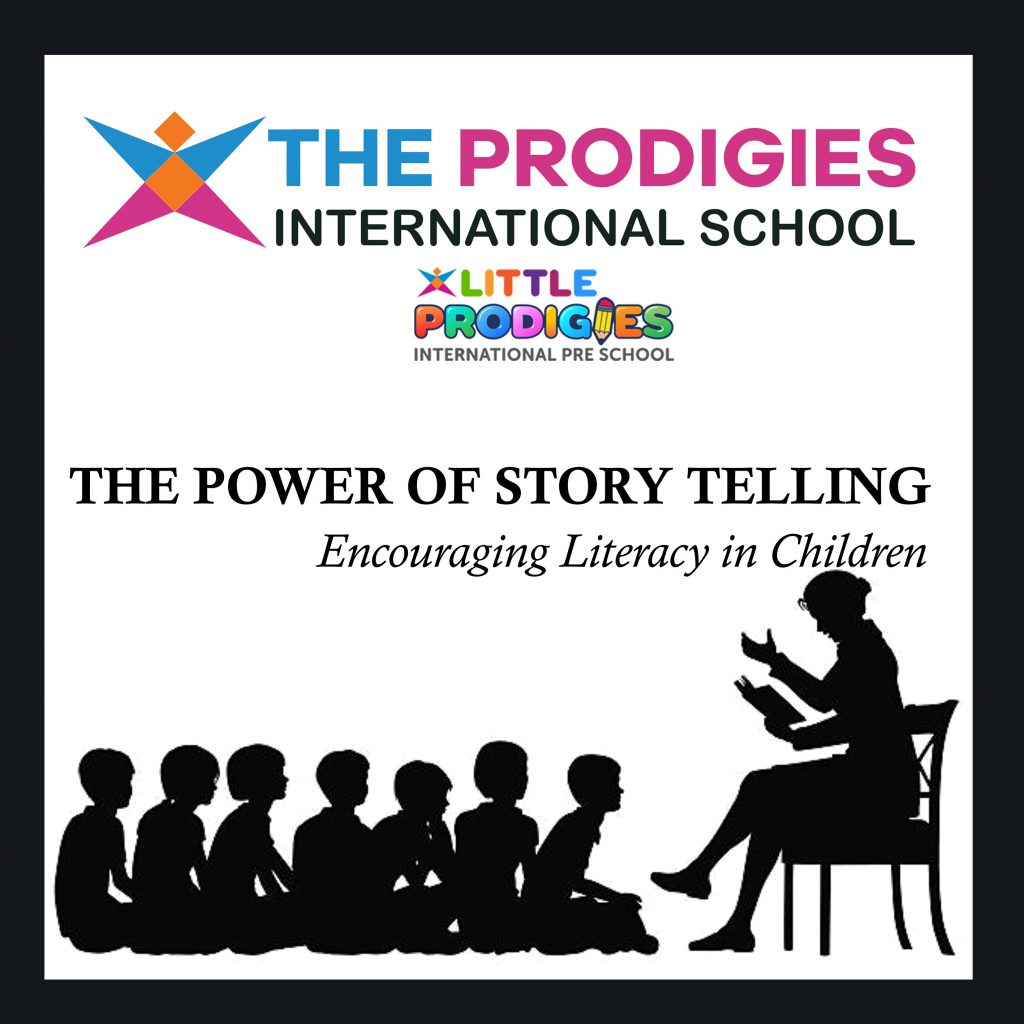Stories hold a special place in every one of our lives. They entertain, inspire, and take us to different magical worlds. But we always see storytelling as a form of entertainment despite the fact that it is a powerful tool to encourage literacy in children.
Storytelling is more than just a form of entertainment. It is a powerful tool that has been an integral part of human communication since time immemorial. From the cave paintings of early humans to modern educators imparting knowledge through engaging narratives, storytelling has been a constant companion in the journey of human communication. It has served as a platform for passing down cultural heritage and moral teachings. It transcends cultural boundaries, making it a universal medium for conveying ideas, values, and experiences. One can also see it as an oldest form of teaching method.
At The Prodigies International School, we delve into the profound impact of storytelling on children, recognizing its pivotal role in shaping not only literacy but also cognitive and emotional development. In this digital era, where distractions are plentiful, the art of storytelling has the ability to captivate young minds and ignite a love for reading.
The Multifaceted Roles of Storytelling
The multifaceted roles of storytelling in education are vast and impactful, transforming classrooms into vibrant spaces of learning and discovery. By weaving narratives into lesson plans and educational activities, educators can tap into the innate human capacity for storytelling to cultivate curiosity, enhance understanding, and foster emotional connections with the subject matter. From enhancing critical thinking skills to promoting empathy and cultural competence, storytelling opens up new avenues for educational growth and prepares students to navigate the complexities of the modern world.
- Instills Values and Morals:
Many stories carry important morals and values. They teach children about kindness, compassion, honesty, and the consequences of their actions. Through storytelling, children learn to differentiate between right and wrong, and they understand the importance of making ethical choices. These valuable lessons learned from stories shape their character and contribute to their overall development.
- Imagination knows no Bounds:
Storytelling is a gateway to fuel the imagination of children. When they hear a story, their minds begin to create vivid images of the characters, settings, and events. This imaginative exercise enhances their cognitive development, cultivating critical thinking and problem-solving skills. As a result, children become more engaged and focused, fostering a love for reading and a desire to explore more stories.
- Building vocabulary and language skills
Stories are a treasure trove of words. Through storytelling, children are introduced to new words, phrases, and expressions that expand their vocabulary. They learn how to use words in different contexts and understand their meanings. Reading or listening to stories also helps children grasp proper sentence structures and grammar naturally. Over time, their language skills improve, and they become effective communicators.
- Introduction of New Ideas:
Stories introduce children to diverse perspectives, cultures, and concepts, broadening their understanding of the world around them. Furthermore, storytelling creates a safe and engaging environment for students to express their own ideas and perspectives, fostering a culture of open dialogue and intellectual growth.
- Critical Thinking:
By engaging young minds in narratives, storytelling prompts students to analyze information, evaluate evidence, and develop reasoned judgments. Through exposure to diverse characters, plots, and perspectives, students are challenged to think critically and question assumptions, enhancing their problem-solving and decision-making skills. As children navigate through the twists and turns of a story, they develop critical thinking skills, learning to analyze situations and make informed decisions.
- Emotional intelligence and empathy:
Stories have the power to evoke emotions and feelings. When children listen or read stories, they connect with the characters, experiencing their triumphs, challenges, and emotions. This emotional connection develops empathy in children, enabling them to understand and relate to others better. By experiencing different perspectives through stories, children learn valuable life lessons and develop strong emotional intelligence.
- Bonding and connection:
Storytelling is not just a solitary activity; it fosters bonding and connection between children and adults. When parents, teachers, or older siblings read stories aloud, it creates a shared experience, strengthening the bond between them. Children feel loved, secure, and valued as they curl up with a book or listen to a captivating tale. This connection promotes a positive attitude towards reading, making it a cherished part of their lives.
In this modern age, where technology often dominates our attention, encouraging literacy in children has become more crucial than ever. Storytelling provides a delightful solution to this challenge. By embracing the power of storytelling, we can ignite the flames of curiosity and imagination in young minds, opening up a world of possibilities through books and literature.
So, let’s come together and celebrate the power of storytelling. Let’s read stories aloud, share our favorite books, and create a story-filled environment for our children. Together, we can inspire the next generation of readers and empower them with the gift of literacy.
At The Prodigies International School, we celebrate the art of storytelling as a catalyst for literacy and overall cognitive development in children. By recognizing its multifaceted benefits, we aim to harness the power of storytelling to nurture young minds, fostering a love for learning that lasts a lifetime. Join us in this journey of imagination, creativity, and literacy, where every story becomes a stepping stone in a child’s educational voyage.


